B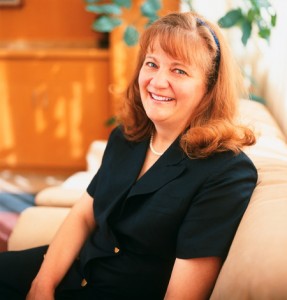 y Elyssa Madsen Andrus, ’99
y Elyssa Madsen Andrus, ’99
In junior high, when her friends were dreaming of the boy next door, Kristie Kay Woodland was thinking about Mexico.
The year before, on a sixth-grade field trip to Ensenada, Mexico, Kristie had seen heartbreaking poverty and had fallen in love with the people she encountered. Deeply impressed by the experience, she started thinking about how she could serve internationally.
“I remember falling asleep at night and thinking, What can I do to help my brothers and sisters in Mexico?” she says.
Kristie held onto those junior high thoughts for many years. It wasn’t until, as Kristie Seawright, ’77, she joined the business management faculty in BYU‘s Marriott School of Management that she realized her dream of international travel and service. But it was to Asia, not Mexico, that Seawright directed her passion for foreign lands, bringing with her a small army of BYU business students to study and to help small-business owners improve their enterprises.
Now, as director of BYU‘s Center for International Business Education and Research (CIBER), Seawright’s focus remains global as she helps students and faculty succeed internationally.
“We are all members of a global community,” she says. “Everything we do should have that perspective.”
from provo to hong kong
Among students, Seawright is perhaps best known as the professor who teaches a class that begins in Provo and ends in Hong Kong. Shortly after Seawright joined BYU‘s faculty in 1993, formerCIBER director Lee H. Radebaugh, ’68, discussed with Seawright the idea of teaching a class in international operations. “I half-jokingly responded, ‘The best way to do that is to take students to several locations in Asia.’ He just said, ‘OK, talk to the director of Study Abroad and figure out how to do it,'” she says.
Rising to the challenge, Seawright developed the curriculum for the Marriott School’s first Study Abroad program. The premise was simple—students need a chance to interact with the government, civic, and business leaders of a country to best understand the nuances of international business.
In 1997 Seawright took 12 graduate students to Tokyo, Japan; Singapore; Ho Chi Minh City, Vietnam; ShenZhen, China; and Hong Kong on a two-week program in Asia. Today, similar Study Abroad programs are available to both graduate and undergraduate business students and are taught by several members of the Marriott School faculty. As part of the programs, students split into service groups and meet with local small-business owners, most in developing economies, to help them improve their companies.
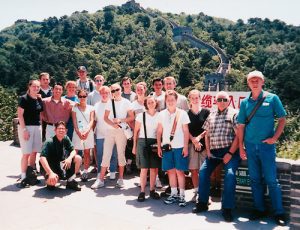
Seawright’s 1999 study group pauses on China’s wall. In 1997 Seawright began taking groups of business students to Asia to learn the nuances of international business.
When Seawright took a group of students to the Philippines, one team helped the owner of a small sari-sari store increase her income by 50 percent. In Ho Chi Minh City, Vietnam, students helped the owners of a small herbal products company make contacts in the United States, so the company could expand when trade relations are normalized. And another year, students worked with the Vietnamese Chamber of Commerce in Ho Chi Minh City to host a volunteer seminar for owners of small-to-medium-sized businesses on basic business strategy.
“On these trips all of a sudden the students realize they can make a difference personally, professionally, and internationally,” says Seawright.
In addition to serving, students who go on the Asia Study Abroad Program have a chance to get a holistic picture of different countries’ business practices. “It’s a whole new world our students are being introduced to,” she says. “They learn things in a way they could never learn them in a classroom. I can teach just-in-time product manufacturing in the classroom, or we can sit on a factory floor in Japan and see it happening.”
One of the advantages of the three-to-four-week long programs is that they give students the opportunity to compare business practices and conditions in several different countries, says Seawright. For example, one day students may be meeting with a bank president in Singapore; the next they may be looking at rice with farmers in Ho Chi Minh City.
Cary L. Campen, ’95, who completed an MBA at BYU in 1997, went with Seawright on that first trip to Asia. He says the trip changed his life. “The experience was so valuable for me that probably not a day goes by that I don’t think about something from that excursion,” he says. “It was exciting to be able to study a culture and then go there and be entrenched in it.”
One of Campen’s favorite experiences was attending a small branch of The Church of Jesus Christ of Latter-day Saints in a small country in southeast Asia. The branch met in a small home, and the kindness and humility of the members there impressed him. This opportunity was just one example of the way Seawright made the trip a profound experience socially, intellectually, and spiritually, he says.
In fact, Seawright’s teaching was part of the reason that Campen decided to become an educator himself. He now teaches finance as an adjunct professor at Chapman University.
“Kristie is well rounded. When you leave a class, you don’t just learn about selling widgets in Russia,” he says. “You learn about why the Russians would want them and how they benefit the people there.”
Seawright says an international viewpoint is particularly important for BYU‘s current students, who live in a wired world, where businesses can communicate instantly and trade has few boundaries.
“I don’t know if there is a single supply chain in the world that isn’t international. This perspective is essential to be successful in business,” says Seawright. “We need to tend our part of the vineyard, but we also need to realize that the vineyard is large and that there are a lot of different kinds of grapes.”
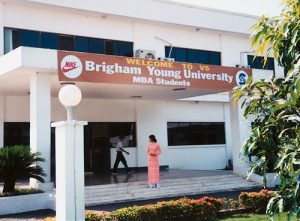
Stops on the Asian study programs have ranged from farms and small businesses to executive offices and large factories, such asthis Nike contract facility in Ho Shi Ming City, Vietnam, where the group visited in 1999.
During the seven programs she has directed, Seawright has seen her share of drama. In 1999, when she and the students were in Vietnam and about to travel to Beijing, the group learned NATO had just bombed the Chinese embassy in Yugoslavia. For a few anguishing hours, Seawright and the accompanying faculty members tried to figure out how the class could divert its trip to avoid the consequences of strained U.S.-China relations. The group was able to spend a few extra days in Singapore and Hong Kong until the U.S. State Department’s travel warning was lifted.
Seawright’s calm under pressure and ability to get along with business and government leaders makes her a great asset to the Study Abroad program. “She knows how to represent us extremely well in international settings,” says W. Steve Albrecht, ’71, associate dean of the Marriott School. “She works equally well in a big city like Tokyo and in the backwoods of Cambodia.”
Drawing on her international savvy, the Marriott School appointed Seawright director of its CIBER in 2000. BYU‘s CIBER is one of 27 such centers funded by the U.S. Department of Education and is a joint effort between the Marriott School and the University of Utah’s David Eccles School of Business. The center promotes international scholarship and research with language instruction, faculty development, and international exchanges and internships for students. It’s the Marriott School’s one-stop program for helping BYU students and faculty thrive in the global economy.
“We are pleased to have a woman of Kristie’s talent, intelligence, and commitment accept this assignment,” said Ned C. Hill, ’70, dean of the Marriott School, upon her appointment. “Kristie is energetically involved in teaching international courses, researching international issues, and leading students on business-related Study Abroad experiences.”
teaching, learning, and pronouncing yogurt
For Seawright, working with students is the joy of her career. “I love teaching,” she says. “My favorite part about it is I’m always learning. Students have new ways of thinking that give me insights into my field.”
It has been less than a decade since Seawright was herself a student. And while her goal for international service has been lifelong, her plans to teach professionally were not. Seawright received her first bachelor’s degree, in family studies from BYU, in 1977. With the arrival of sons Jason, now 24, and Alan, 20, Seawright funneled all her energy into motherhood.
When her children were young, Seawright took occasional courses at the University of Utah, primarily “to have some adult conversation,” she says. Course by course, Seawright’s credits piled up until, in 1987, she had enough hours for a bachelor’s degree in accounting.
Along the way Seawright found that she truly enjoyed the work. She decided to continue her education at the University of Utah, receiving an MBA in 1989 and a PhD in 1994.
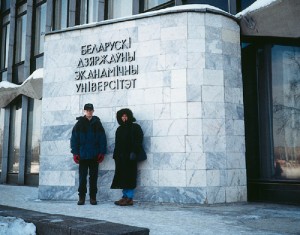
In 1996 Seawright (right, with son Alan,) received a Fulbright Fellowship to teach at the Belarus State Economics University. “We are all members of a global community,” she says, “Everything we do should have that perspective.”
Just three years after joining BYU‘s faculty, Seawright received a Fulbright Fellowship to teach at the Belarus State Economics University in Minsk, Belarus, for a semester. She was delighted, but the opportunity posed one small problem. For all her love of foreign lands, Kristie Seawright is terrified of flying. “I hate to travel, but it is the only way I can figure out how to get there.”
Unwilling to let a little air terror stop her, Seawright boarded a plane with her husband, Larry L. Seawright, ’77, and younger son, Alan, who was 14 at the time. After a full day of traveling, the family arrived in Belarus, a small nation between Russia and Poland.
“The day we landed in February, at 1:30 in the afternoon, the high was 33 degrees below zero. We were thinking, What have we done?” says Seawright. “Our teenager made it clear that day that we were ruining his life.” That same teenager, currently a Church missionary in the Russia St. Petersburg Mission, now readily reports that the semester in Minsk was one of the most powerful experiences of his premission life.
Despite the inauspicious beginning, the trip proved to be a positive adventure.
“Kristie worked very hard to learn as much Russian as she could,” Larry says. “One time we were at a grocery store, and Kristie pointed toward something and asked, ‘What is the name of that?’ The clerk, this very sweet person, slowly said, ‘It is yo-gu-rt.’ The Russian word for yogurt is yogurt. That just cracked us up. The clerk couldn’t understand why we were rolling in the aisles laughing.”
One of the highlights of the trip was the university students’ eagerness to learn the basic business strategies Seawright was teaching. “At the end of the class, when the bell would ring, my students would say, ‘Oh please, won’t you stay and teach us more?'” Seawright says, adding with a laugh, “That is the only time in my life that has ever happened.”
In actuality, students at BYU seek her out readily, says Roman R. Andrus, ’58, a professor emeritus of business management at the Marriott School. Many female students, in particular, look to Seawright as a mentor, he says.
Though she is busy with administrative duties and research, Seawright is always happy to pull up a chair for students who stop by her sixth-floor Tanner Building office to shoot the breeze or seek advice.
Part of the draw for students is Seawright’s infectious friendliness. She is known for being quick to smile and laugh and for remembering birthdays. “If you want to know what is happening—whose spouse is sick, whose child received a mission call, how do you go to the university and get something approved—Kristie is the person who knows all those things,” says Brent D. Wilson, a formerBYU associate professor of business management who was recently named dean of BYU—Hawaii’s School of Business.
“Kristie cares about people as colleagues, but she cares about them as people, too,” says Kristen B. DeTienne, a Marriott School associate professor of organizational leadership and strategy. DeTienne has collaborated on research with Seawright and says Seawright has compassion that is rivaled by few.
globalizing scholarship
Seawright’s sense of camaraderie and desire to work with others has led to several joint authorships of papers and collaborations on research. Her two main areas of emphasis are international entrepreneurship and cross-cultural services management. With cross-cultural services management, Seawright and colleagues are studying how globalization affects high customer-contact service industries like banking and retailing.
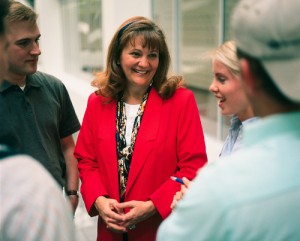
Seawright is a popular professor in the Marriott School, where she is not only respected as a scholar but also appreciated for her personality. “Kristie cares about people as colleagues, but she cares about them as people, too,” says associate professor Kristen Detienne.
“The underlying objective of my research,” says Seawright, “is to help my brothers and sisters everywhere to have the discretionary time and resources to experience the joy that comes from voluntary service. The r
esearch that I do is created that way—helping managers increase productivity and improve business effectiveness to the point where they someday have the free time and resources to serve more actively.”
A particularly rewarding part of Seawright’s scholarship is being able to present papers with Larry, who is pursuing a PhD in instructional technology at BYU. His dissertation is focused on Web-based distance education.
“One of the things distance education is trying to do over time is get students all over the world involved with one another in a meaningful way, where they can have cross-cultural business experiences,” Larry says. “That ties our two areas of specialization together.”
Together the two presented a paper, “The Next Mode of Global Transportation: Cyberspace,” to the Academy of International Business Conference in 1998, and in July 2001 they presented an updated version of the paper at the Asia Pacific Decision Sciences Institute in Singapore. For the couple, who have been married 25 years, the most recent conference was a chance to mix scholarship with pleasure.
After presenting their paper, they took a Yangtze River cruise to see the famed Three Gorges, which are going to be dammed and flooded over the next few years. Larry says that Kristie—ever watchful of opportunities for her students—convinced him to go because she wanted to see if it would be a good excursion for study abroad.
With her appointment to direct CIBER, Seawright has seen her focus shift from taking students on study abroad programs to training other faculty to run them. Not that she would refuse one more trip to Asia if she were really needed.
Even for someone who hates to fly and doesn’t particularly like living out of a suitcase, the opportunity to meet and serve people around the world is just too tempting to pass up.
“Once it is in your blood,” she says, “it is always in your blood.”









